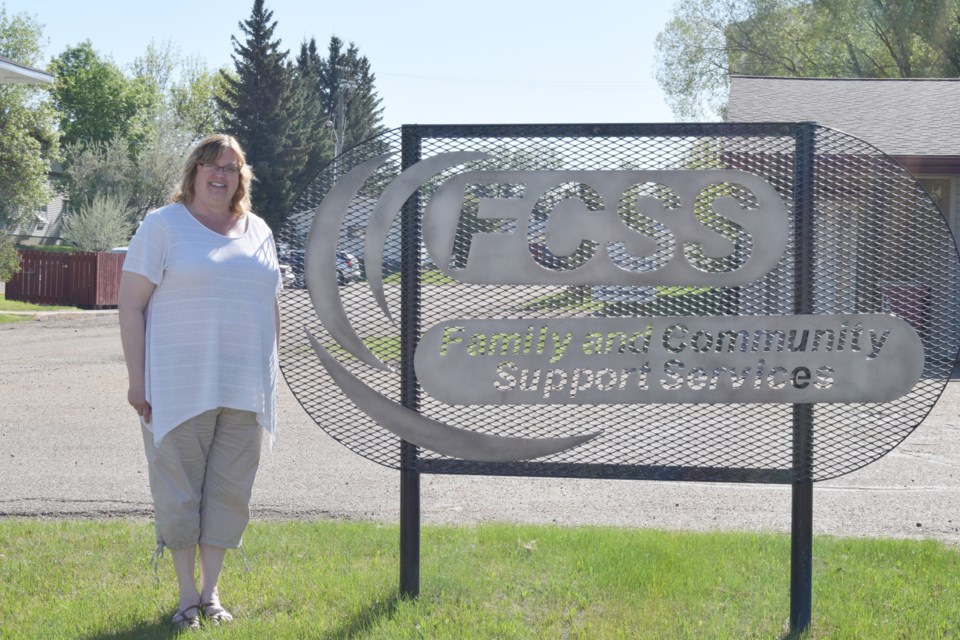Cheri Jantz knew it was too good to last.
Jantz is an outreach mentor for Barrhead and District Family Community Support Services' (FCSS) Thrive program. For the two months of the coronavirus pandemic, the number of clients reaching out for her services had not increased.
Thrive is FCSS's family violence and relationship abuse prevention initiative. It gets its name because that is what they hope its clients will do after accessing its services.
"It was really quiet for the first couple of months, but it has been slowly increasing," she said.
Part of the reason for this, Jantz said, is because of the added stress the virus is having on relationships, whether it be economic because one of both partners in a relationship have lost their jobs and the bills are starting to mount or because of the tension of prolonged exposure to each other in a confined space.
The other problem Jantz and other community violence outreach workers face is the difficulty in accessing necessary services due to the virus.
Luckily, for the most part, she said the safety measures imposed by Public Health and Alberta Health Services (AHS), did not hamper her ability to communicate with her clients, as she could do so over the telephone and for the most part she could still access many of the supports needed for her clients, with the major exception of those provided by the judicial system.
Due to COVID-19 restrictions, have drastically scaled back in-person hearings since the start of the pandemic in March. And although courts have attempted to compensate by increasing the use of teleconferencing technologies, unfortunately, they could not make up for the loss of in-person attendance, and as a result, many court services are difficult to access if they can be at all.
This is especially true, Jantz said, in family court.
"The challenges for my people is working out parenting agreements. "Having clarity around these agreements and custody can take away an opportunity for conflict, " she said. "In a domestic violence situation when the courts have decided on parenting and financial issues, as well as on the division of property takes away an opportunity to further abuse. If that clarity isn't there the abuse continues."
(As part of the province's Stage 2 reopening strategy Chief Judge Terrence Matchett announced plans to restart physical hearings on July 6 at "base-point courts" with enhanced health and safety measures in place. The Provincial Courts in Barrhead, Westlock and Athabasca are considered circuit courts and will remain closed.)
She added abusers will go to great lengths to continue to harass and torment their would-be targets and that they are using the virus as another tool.
Jantz said to a lesser extent, the pandemic has also makes it more difficult to place clients in women's shelters, something in her experience is rarely done. In four years as a Thrive outreach mentor in Barrhead and Westlock, she has placed only one client in a shelter.
Although she says, when they are needed "are really needed, they are not common in rural communities for several reasons.
One of the first being that in smaller communities, knows where the shelter is, including the abuser.
"When you live in the city, there are several shelters and they give people the ability to disappear," Jantz said. "But if you live in rural Alberta, everyone knows where the shelter house is, including a person's abuser."
She added another purpose of shelters is to give victims of abuse skills and supports, so they can leave their situations. One of the supports often includes job training.
"In rural Alberta, more often than not, the victims of abuse have jobs, live miles from where they were born and have extended family and other supports that a shelter would provide," Jantz said. "Going to a shelter, especially in another community would you be willing to leave that emotional support system, built-in child care behind?"
In 2014, Sparrow's Hope, a women's crisis or safehouse serving the Westlock-Barrhead region, shuttered its doors. It was spearheaded by Westlock Youth for Christ and started accepting clients in 2011.
Regardless of whether a shelter is a viable option, to help clients get out of an abusive situation, Jantz helps her clients come up with a suitable safety plan. And a large part of that safety plan is having proper supporting documents.
"When there are problems, if there is a problem, they can show the police a copy of the parenting agreement," she said.
Although no system is perfect, what Jantz would like to see is Canada adopt a model similar to Australia.
"The laws are such that the abuser gets taken out of the home and the family gets to stay," she said. "As an advocate who deals with victims of domestic violence, I would love to see that happen. Why should the people who have done nothing wrong be the ones that have to suffer the turmoil of finding a new job and have to enrol their children in new schools, et cetera?"
Until then Jantz and other domestic abuse advocates will continue to help people the best they can and hope as COVID-19 restrictions will lift to the point that they will once again be able to access the supports for their clients through the family court.
For more information about Thrive or to schedule an appointment with Jantz, call Barrhead FCSS at 780-674-3341.
Barry Kerton, TownandCountryToday.com
TOWNandCOUNTRY
COVID-19 UPDATE: Follow our COVID-19 special section for the latest local and national news on the coronavirus pandemic, as well as resources, FAQs and more.



.jpg;w=120;h=80;mode=crop)